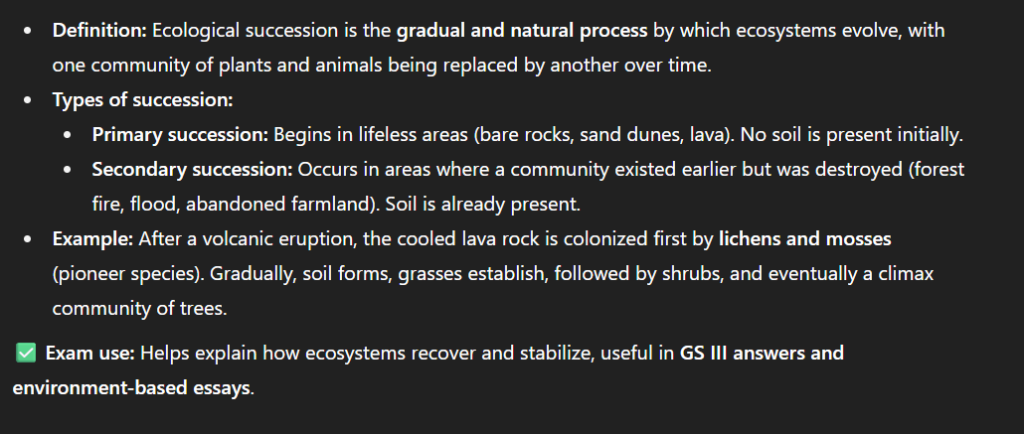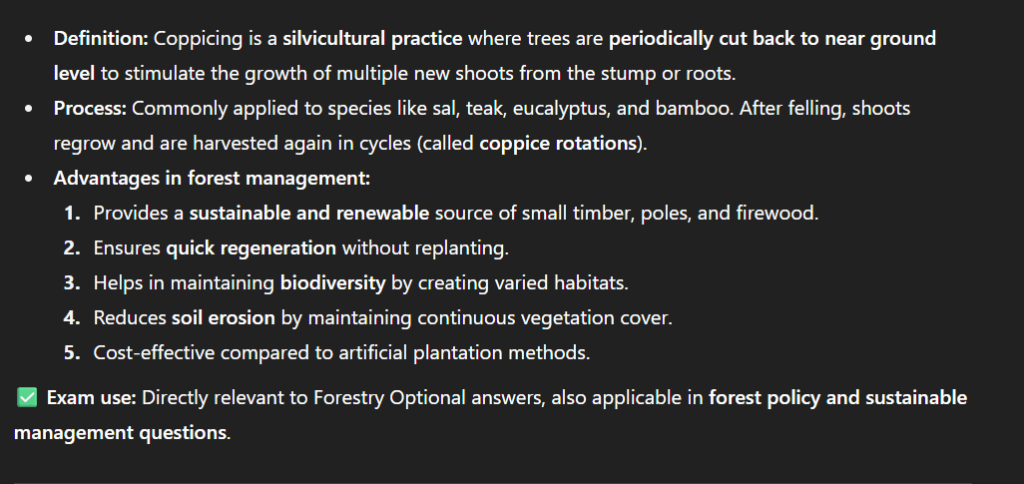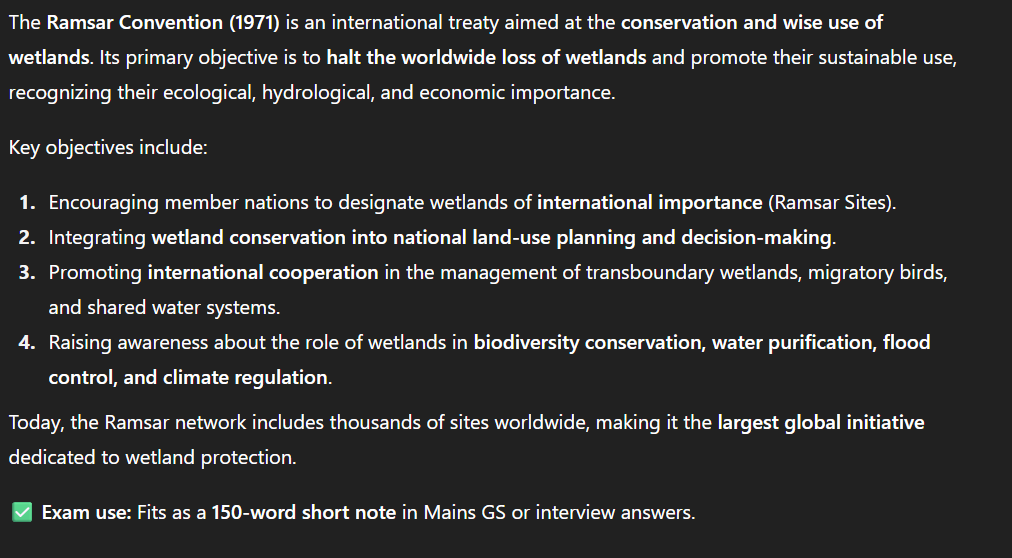How to Study For IFS Exam
with ChatGPT ?

Index
- Introduction – Preparing For Your IFS Exam With ChatGPT.
- How To Use ChatGPT Input Methods For IFS Exam.
- Examples About Using ChatGPT For IFS Subjects
- Practice Using AI & Prompting With Google AI Chatbot.
- Conclusion
- FAQs.
- Related Articles.
Cultivating Success: How to Study for the IFS Exam with AI Power
The Indian Forest Service (IFS) exam, conducted by UPSC, demands a high level of preparation in both general studies and optional science subjects like Forestry, Geology, Agriculture, Botany, and more. With such a broad and technical syllabus, many aspirants often find it overwhelming to stay on track. This is where ChatGPT AI becomes a powerful 360-degree support tool. When combined with your regular study material, ChatGPT acts as your personal tutor, answer guide, practice partner, and revision assistant — all in one.
Whether you’re solving MCQs for Prelims, structuring answers for Mains, or preparing for the Interview, ChatGPT can simplify complex topics, generate practice questions, and help you understand current environmental and ecological issues in depth.
I started on a fast track with AI when ChatGPT was released in November 2022. Every day, I use Google Gemini to build skills and conquer new challenges. My personal journey, including creating this website, proves AI’s effectiveness. AI can truly support you in your studies and skill development if you’re willing to learn. Lets take a look at how ChatGPT can contribute.
How Can ChatGPT Help with IFS Preparation ?
- Get clear answers and explanations for questions on Botany, Forestry, or any other IFS exam subject.
- Easily locate helpful videos and books online to deepen your understanding.
- Access and create sample papers and practice material designed to build your confidence for the IFS exam.
- Get expert assistance finding images, statistics, and all the material you need for your projects.
and much more to help you need to succeed!
Ready to Learn how to study anything in your AIIMS MBBS syllabus with the help of OpenAI's powerful tool ChatGPT ?
All You Need is
- Your notes or your text book
Before you start, you need access to ChatGPT. You can either download the app or use it on your browser:
On mobile (iOS or Android):
Download ChatGPT from the App Store
Download ChatGPT from Google PlayOn browser:
Visit ChatGPT on web
Create a free account or log in.
- Read this article to learn how
That’s All you need to make yourself a tutor ready to answer all your questions, at anytime for FREE !!!
And remember to share this article with anyone you think may need it.
How To Use ChatGPT Input Method's For IFS Exam Prep.
1. Text Prompts

Best for detailed questions, definitions, conceptual clarifications, or drafting answers for Mains.
Example Use: “Explain the Forest Conservation Act 1980 in simple terms.”
2. Voice Input
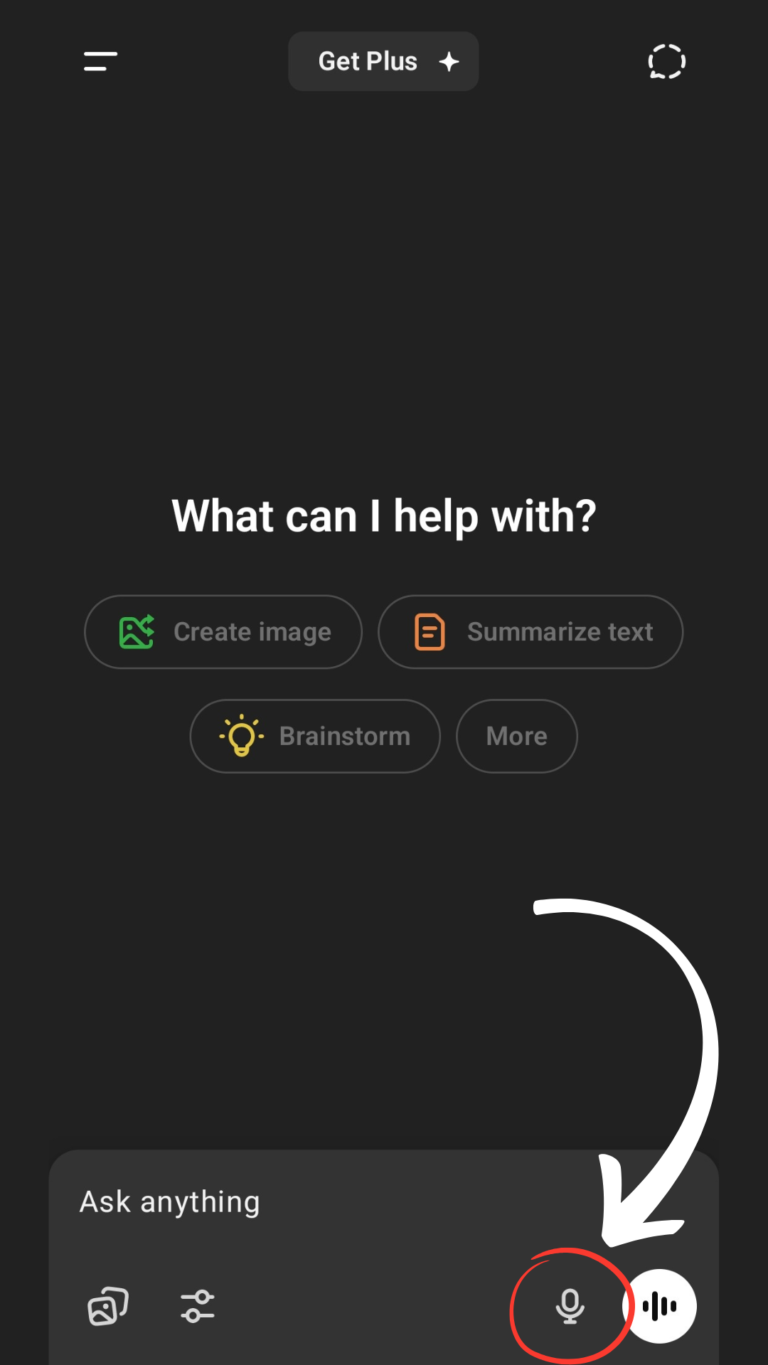
Voice prompts are perfect for revision, brainstorming, or quick Q&A sessions when you’re away from the screen.
Example Use: “What are the major causes of desertification in India?”
3. Image Input
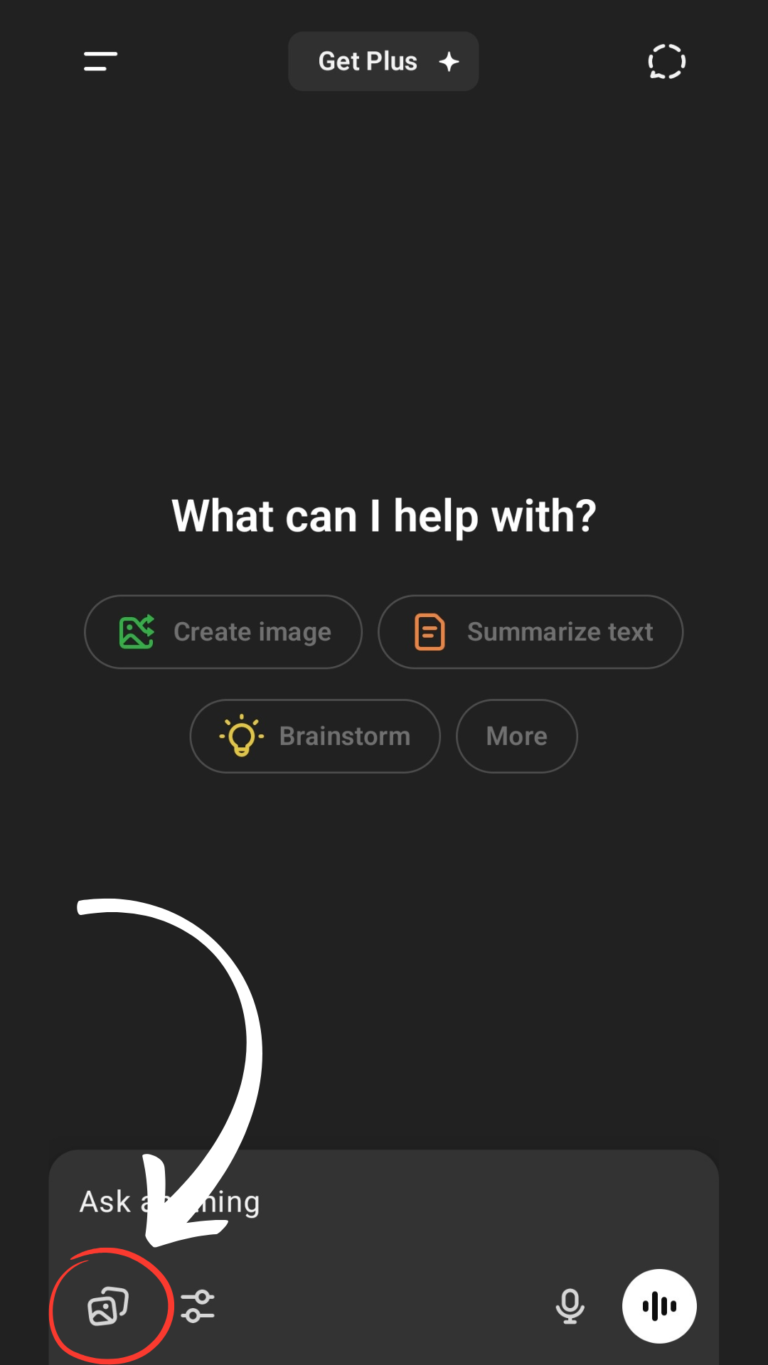
You can upload a graph, map, diagram, or screenshot from your study material, and ChatGPT will break it down for you.
Example Use: Upload a biodiversity hotspot map and ask: “Explain the Western Ghats’ ecological significance.”
Examples of ChatGPT Prompts For IFS Exam Preparation.
Example 1: IFS Environment & Ecology – GS Paper III (Prelims + Mains)
“Explain the concept of ecological succession with an example.”
Your ChatGPT Text Prompt
“Explain ecological succession in simple terms, differentiate types, and give one relevant example.”
How ChatGPT Will Answer (Like a Personal Tutor):
ChatGPT currently supports 20 Indian languages. Some are - Hindi, Bengali, Gujarati, Kannada, Malayalam, Marathi, Tamil, Telugu, and Urdu.
Click to enlarge.
Example 2: IFS Forestry Optional – Silviculture Topic
“What is coppicing? Explain its advantages in forest management.”
Your ChatGPT Text Prompt
“Define coppicing clearly, mention process, and list advantages for sustainable forestry.”
How ChatGPT Will Answer (Like a Personal Tutor):
ChatGPT currently supports 20 Indian languages. Some are - Hindi, Bengali, Gujarati, Kannada, Malayalam, Marathi, Tamil, Telugu, and Urdu.
Click to enlarge.
Example 3: IFS General Awareness – International Environmental Treaties
“Summarize the objectives of the Ramsar Convention in 150 words.”
Your ChatGPT Text Prompt
“Write a structured 150-word summary on Ramsar Convention objectives, highlighting its global significance.”
How ChatGPT Will Answer (Like a Personal Tutor):
ChatGPT currently supports 20 Indian languages. Some are - Hindi, Bengali, Gujarati, Kannada, Malayalam, Marathi, Tamil, Telugu, and Urdu.
Click to enlarge.
Practice and Perfect Your Prompts with Our AI Tutor (Powered By Gemini)
How It Works –
- Choose Your Course: Select the subject you want to practice.
Get Your Question: Our AI will ask you a question from the official syllabus.
Write Your Prompt: Try to get the answer by writing the best prompt you can.
Receive Instant Feedback: The AI will provide the correct answer and review your prompt, giving you tips to make it better.
AI Study Assistant
Nurturing Your IFS Aspirations with AI-Powered Learning
The IFS exam tests not just memory, but depth of understanding and the ability to interlink scientific, ecological, and administrative knowledge. ChatGPT supports your preparation by offering on-demand clarification, concept simplification, and answer enhancement, just like a personal mentor. Whether you’re stuck on silviculture or revising biodiversity conventions, ChatGPT helps you stay productive, focused, and well-prepared.
Use it alongside your textbooks, notes, and test series to create a smart, AI-supported study ecosystem. With the right strategy and tools, cracking the IFS exam becomes a lot more achievable.
Written By
Prateek Singh.
Last Updated – August, 2025
About The Author
Prateek Singh believes the best way to learn is to get your hands dirty. He went from talking to customers in sales to building the online platforms they use. IndiaShouldKnow.com is his way of sharing that practical, hands-on knowledge with you.
FAQs For Using AI.
Q: Can I trust every answer an AI tool gives me for my studies?
A: No, you should not trust every answer completely. Think of an AI as a super-smart assistant that has read most of the internet—but not every book in the library is accurate.
AI can sometimes make mistakes, misunderstand your question, or use outdated information.
It can even “hallucinate,” which means it confidently makes up an answer that sounds real but is completely false.
Rule of Thumb: Use AI answers as a great starting point, but never as the final, absolute truth. Always double-check important facts.
Q: How can I verify the information I get from an AI for my academic work?
A: Verifying information is a crucial skill. It’s like being a detective for facts. Here are four simple steps:
Check Your Course Material: Is the AI’s answer consistent with what your textbook, lecture notes, or professor says? This is your most reliable source.
Look for Reputable Sources: Ask the AI for its sources or search for the information online. Look for links from universities (.edu), government sites (.gov), respected news organizations, or published academic journals.
Cross-Reference: Ask a different AI the same question, or type your question into a standard search engine like Google. If multiple reliable sources give the same answer, it’s more likely to be correct.
Use Common Sense: If an answer seems too perfect, too strange, or too good to be true, be extra skeptical and investigate it further.
Q: What is the difference between using AI for research and using it to plagiarize?
A: This is a very important difference. It’s all about who is doing the thinking.
Using AI for Research (Good ✅):
Brainstorming topics for a paper.
Asking for a simple explanation of a complex theory.
Finding keywords to use in your library search.
Getting feedback on your grammar and sentence structure.
You are using AI as a tool to help you think and write better.
Using AI to Plagiarize (Bad ❌):
Copying and pasting an AI-generated answer directly into your assignment.
Asking the AI to write an entire essay or paragraph for you.
Slightly rephrasing an AI’s answer and submitting it as your own original thought.
You are letting the AI do the thinking and work for you.
Q: How can I use AI ethically to support my learning without violating my school's academic honesty policy?
A: Using AI ethically means using it to learn, not to cheat. Here’s how:
Know the Rules: First and foremost, read your school’s or professor’s policy on using AI tools. This is the most important step.
Be the Author: The final work you submit must be yours. Your ideas, your structure, and your arguments. Use AI as a guide, not the writer.
Do the Heavy Lifting: Use AI to understand a topic, but then close the chat and write your summary or solve the problem yourself to make sure you have actually learned it.
Be Transparent: If you used an AI in a significant way (like for brainstorming), ask your professor if you should mention it. Honesty is always the best policy.
Q: Can an AI's answer be biased? How can I detect this in its responses?
A: Yes, an AI’s answer can definitely be biased. Since AI learns from the vast amount of text on the internet written by humans, it can pick up and repeat human biases.
Here’s how to spot potential bias:
Look for Opinions: Does the answer present a strong opinion as a fact?
Check for One-Sidedness: On a topic with multiple viewpoints (like politics or economics), does the AI only show one side of the argument?
Watch for Stereotypes: Does the answer use generalizations about groups of people based on their race, gender, nationality, or other characteristics?
To avoid being misled by bias, always try to get information from multiple, varied sources.
Q: Is it safe to upload my personal notes, research papers, or assignments to an AI tool?
A: It is best to be very careful. You should not consider your conversations with most public AI tools to be private.
Many AI companies use your conversations to train their systems, which means employees or contractors might read them.
There is always a risk of data breaches or leaks.
A Simple Safety Rule: Do not upload or paste any sensitive information that you would not want a stranger to see. This includes:
Personal identification details.
Confidential research or unpublished papers.
Your school assignments before you submit them.
Any financial or private data.
Related Articles
Sign Up for Our Newsletter To Learn More About the Latest In AI And Learn How To Use It.
Unlock your learning potential and stay ahead in the age of AI! Join the IndiaShouldKnow.com newsletter to discover how to seamlessly integrate AI into your studies for school, entrance exams, college courses, for your Career and Life. Plus, get the latest insights on cutting-edge AI tools that can empower your career and enrich your life. Subscribe now for monthly updates.

